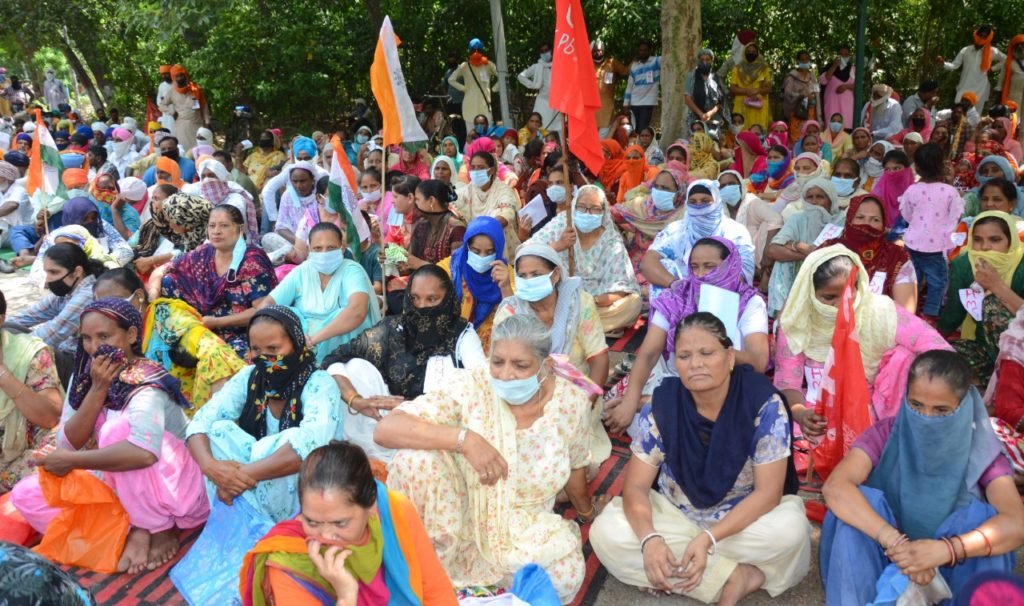Sabrangindia and Dinkar Kapoor
A joint action committee of Central Trade Unions (CTUs) came together to hold nation-wide protests against draconian changes in labour laws, privatisation of government departments and PSUs and for rights of unorganized sector workers. Members of the Indian National Trade Union Congress (INTUC), All India Trade Union Congress (AITUC), Hindu Mazdoor Sabha (HMS), Centre of Indian Trade Unions (CITU), Self Employed Women’s Association (SEWA) among others observed Nationwide Protest Day on July 3, 2020 throughout the country, in all workplaces and centres as a united struggles of Non-Cooperation and Defiance to anti-worker, anti-farmer, anti-people and anti-national policies of the Govt. The action programmes were reportedly organised in almost one lakh places in all states in all workplaces, union offices, on roads and streets.
Protests took place at the Shram Shakti Bhawan in New Delhi, at a Vizag steel plant, a motorcycle rally was taken out in Punjab and demonstrations were held in over 1 lakh places in the country, including Puducherry, Uttar Pradesh, Punjab, Odisha and Maharashtra among others.
A statement by the CTUs said that through the protests, they “reiterated their opposition to disinvestment and wholesale privatisation of Public Sector Enterprises, 100 percent FDI in core sectors – Indian railways, Defence, Port and Dock, Coal, Air India, Banks, Insurance Privatisation of Space Science & Atomic Energy etc., steps in favour Corporates of Indian & Foreign brands to usurp natural resources and business of the country while mouthing behind the slogan of Aatma-Nirbhar Bharat. The decision of DA freeze of 48 lakh Central Government Employees and DR freeze of 68 lakh pensioners, which is also having impact on the state government employees, is not withdrawn despite vehement opposition from Government employees and CTUs. Neither the demand of cash transfer of Rs.7500/- to all non-income tax paying persons accepted.”
The CTUs added, “With the opening up of some industrial units, all workers are not being taken back, only a small percentage is finding their place back in jobs and that also on reduced wages and refusal to pay lockdown period salary. Such denial of employment and pressing for wage-reduction have to be unitedly combated.”
The unions added that adding the total number of unemployed persons who are out of a livelihood at present, including those working as daily wagers, contract workers and casual workers amounts to more than 24 crores. The rate of unemployment had reached 27 percent by April. It said that Medium and Small Enterprises themselves reported that 30 to 35 percent of units may not be able to begin activities. Speaking about the issues enraging workers, the CTUs quoted the Indian Labour Organization which said that more than 40 crore people would be pushed into deeper poverty and in the coming times, malnutrition would increase and hunger deaths would become a daily reality. They also spoke about eminent scientists and medical experts warning of the threat of depression and suicides among workers who have been dealt with insensitively during the pandemic.
Speaking about the Central government’s handling of the pandemic, the CTUs alleged, “Modi government has most insensitively dealt with the problem of Covid-19 as a law and order issue instead of treating it as a medical emergency for the human being and society. It has caused immense miseries to millions of workers, farmers and other vulnerable sections of the society. Whereas, the Government stood only by Corporates & big businesses.”
Concluding their statement, the CTUs said, “A Government which has no respect and concern, towards the rights and basic survival-entitlements of workers and the people does not deserve any co-operation. We the workers/employees and trade unions need to do everything possible to be in solidarity with each other, unitedly face the disease taking all precautions necessary, stand with each other to defend our rights of unionization, collective bargaining, decent working conditions, wages & future securities etc. This government has demonstrated cruel insensitivity of the basic human needs of the workers and people. This cannot be endorsed and cooperated with the leaders said while addressing the gathering at Shram Shakti Bhawan.”
Strike against Railway Privatisation
Recently, CITU had reacted strongly to the Central government’s Request For Qualification (RFQ) extended to the private corporates, both Indian and international, for operating passenger train services over 109 pairs of stations. The CITU has called this an “anti-national” move by the government. According to a statement issued by Tapan Sen, General Secretary. The CITU has alleged that this move has put “Indian Railways, the pride of India and its precious wealth, on sale”.
Some of the companies who have bid for the same are Adani Ports, Tata Realty and Infrastructure, Essel Group, Bombardier India and Macquarie Group, Moneycontrol reported. Adani Ports owns one of the largest private railway lines in India which spans 300 km and connects ports and other business hubs for cargo movement. It also set up its own subsidiary to focus on metro rail projects.
In 2018, Essel Infraprojects Ltd won the first railway project for Rs 17.06 billion on the Eastern Freight Corridor connecting Howrah and Chennai mainline. In May, Bombardier India won the contract to supply 210 commuter and metro cars for the Delhi-Meerut Regional Rapid Transit System.
CITU had highlighted that the Union government’s claim of a Rs 30,000 crore investment and employment generation had no meaning as the drainage due to loss of revenue to the Indian Railways in these revenue generating routes and that the potential loss of employment due to privatisation would be much higher than any fresh employment which would not guarantee permanent jobs or social security.
Coal workers strike
More than half a million coal workers also participated in the protests opposing the privatisation of the coal sector through the government throwing open 41 coal blocks mainly in Maharashtra, Madhya Pradesh, Chhattisgarh, Jharkhand and Odisha. Activist Stan Swamy had shed light on the fact that most of these coal blocks to be auctioned are located in Adivasi-inhabited areas, on Adivasi land and forests. None of the stakeholders, including the state governments were consulted before opening up these blocks for commercial mining. Throughout the country, irrespective of their political affiliation, collieries participated in the strike to oppose the government’s plan to privatize Coal India Limited (CIL) or sell of mines in Singareni.
Farmers, contractual and casual workers join strike
The All India Kisan Sangharsh Coordination Committee – which consists of 130 farmers’ groups – also expressed solidarity to the Friday protest, saying that “the lockdown is being used by the central government to enact laws against farmers and workers to swiftly implement policies that promote and support corporates,” Newsclick reported. Demonstrations by the All India Agricultural Workers’ Union (AIAWU) and MGNREGA workers were also held across Punjab and Maharashtra.
The Defence civilian employees also joined the strike in opposition to the government’s decision to corporatize the Ordinance Factory Board, allow private players to operate army workshops, abolition of posts in military engineer service and army units, outsourcing and FDI in defence and reduction of manpower in the Directorate General of Quality Assurance, The Times of India reported.
TOI also reported that in Tiruvananthapuram, Trivandrum Airport Casual workers trade unions decided to continue the token strike at the airport against the layoff of ground by Air India SATS. We were informed that cargo operations were hit due to unavailability of employees. The members of all trade unions, CITU, INTUC and BMS are jointly participating in the strike. The company has over 900 staff at the airport, which includes 200 managerial staff. We had requested them not to terminate the staff during the lockdown and that we are ready to take a salary cut. They terminated senior staff with nine years of experience, while retaining newly-recruited staff,” P Rajendradas, general secretary, Trivandrum International and Domestic Airport Contract Workers Union (CITU) told TOI.
◆◆◆
Privatization of Coal Mining is Anti-National, Every Patriot should Support the Workers’ Movement
Dinkar Kapoor
2 July 2020: From today, millions of coal workers are on strike against privatization of the coal sector all over the country. In this, apart from the Left organizations, even the BMS associated with the RSS has to be involved under heavy pressure. There is anger among the workers that the Modi government is intent on bringing back the tragic life that their forefathers had endured and worked in unsafe life due to the transfer of coal to private hands. Those of the new generation who have seen the film Gangs of Wasseypur may have discovered how coal workers had their lives like slaves before the nationalization of coal. This is also reflected in the film Kaala Patthar made in the eighties. This is a three-day strike of coal workers against the return of these days of slavery, which will start from today till 4 July. This is the reason why usually, since the Modi government has come for the last 6 years, despite the continuous attack on the working class, it will not be involved in any national antagonism, even on such occasions, who oppose the protest of the working class and the nation the BMS, slogan of paramount interest, has to join the strike despite the appeal of Minister Prahlad Joshi, who called for the withdrawal of the strike in the national interest.
However, not withstanding strike of coal workers, the auction process of 41 coal blocks allowing 100% FDI in the coal sector started on June 18, 2020 as part of the Modi government’s policy of turning the disaster in the Corona epidemic into an opportunity for corporate’s profit. The verdict is being opposed. The coal minister’s appeal issued yesterday on this strike said that the import of coal is against the national interest, so to ensure the supply of coal in the country; the government had to take a decision which is in the national interest. He says that import of coal by the world’s fifth highest coal storage country is nothing less than a sin. He said that China is the world’s largest coal producing and consuming country by extracting 3500 million tons of coal, the third-ranked coal storage country in the world. Now even a person of common knowledge should think about how coal mining done by foreign companies is in the national interest whereas these companies have been given complete exemption to export coal after mining. Will Indian needs be met by mining it by foreign companies? Probably not. You can see that out of the requirement of 976 million tonnes of coal in India last year, 729.10 million tonnes of coal was mined by the public sector Coal India Limited and if there is a shortfall then the government is responsible for it. Who has committed the sin of harming the interests of the nation by not framing policy and acting on it.
In fact, coal, an important source of energy, which produces more than seventy five percent of the total of 198534 MW out of 370348 MW generated in our country, its looting game started with the advent of new economic industrial policies. The economic reform program of Manmohan Singh had said goodbye to Indira Gandhi’s nationalization of coal (Nationalization Act1973) at the same time. The then government allowed private companies for captive mining for the first time after nationalization in 1993, for which no transparent system was created, not even a law, but just by administrative decision by the screening committee. Such a big policy decision was implemented. Later Atal government, following the policy of ‘first come first serve’, decided to sell coal and started the process. Carrying forward this policy, the UPA government also implemented it and as a result, the coal sector was allocated to companies which had nothing to do with the consumption of coal. On this, the CAG in its final report which was tabled in Parliament said that the coal block allocation made without any bidding and arbitrariness was loot of the government exchequer of Rs 1.86 lakh crores. The Supreme Court even cancelled the allocation of 214 out of 218 coal blocks in 2014, being illegal. With this, 100 coal blocks were allocated to Tata Group, Jindal Steel, Birla Group, Essar Groups, Adani Groups, Lanco etc. In this scam, summon was also issued to former Prime Minister Manmohan Singh. Former Jharkhand CM Madhu Koda and some senior officials of the Center are still in jail. The chargesheet also names Naveen Jindal of Jindal group and Gautam Adani, Modi’s favourite corporate friend. The CBI investigation is still going on in this case.
You will remember that the Coalgate Scam had become a national question and there was a movement against it throughout the country and it became the main issue of the anti-corruption movement. The Bharatiya Janata Party lodged a counter-protest on this and also made it a big electoral issue. In the ten-day fast at Jantar Mantar in February by All India People’s Front, took a political resolution demanding a halt to it whether its being in the national interest, whether it is an auction or ‘first come first serve’ policy of coal but it is the main source of energy in the country. There demand for a stay by AIPF clearly said that for national interests and development, coal which is the main source of our power generation should not be handed over to the domestic and foreign corporate houses. This will halt the development wheel of the country as its energy needs will be constrained due to its mining and sale to corporate interests and its consequences will be far-reaching.
After this, the Modi government changed the policy of ‘first come first serve’ and started the allocation of coal blocks by the auction process and for this Mines and Minerals (Development and Regulation) Act 1957 and Coal Mining (Nationalization Act) 1973 Amended the Coal Mining (Special Provisions) Act 2015, was also amended and passed the Mineral Laws (Amendment) Act 2020 in March. Since its inception, the monopoly of Coal India Limited in the coal mining sector will come to an end and corporate companies, including 100% FDI, will be allowed to buy and sell coal in the open market.
It may be noted that after the nationalization of coal mining in 1973, mining by private companies was not allowed. It is a fact that due to limitations and weaknesses of private mining companies, the coal sector was nationalized according to the needs of the country. Only after this nationalization, coal could be produced according to the needs of the country; even the question of working condition, environment and displacement relative to private mining was better resolved. If we were to go on this path and the coal sector government companies were operated at full capacity then we would have been self-sufficient in coal production. This is to say that there is sufficient capacity of the coal mining PSUs and there is scope for increase as per the requirement, but the real objective of the government is to create a market for loot and huge profiteering for corporates in the coal sector. Hence the argument that coal will be cheaper and ensure availability due to increased competition from FDI and privatization in the region is completely baseless.
A similar argument was also given in relation to corporate companies for power generation, the result of which is before us. On the basis of the same logic, all the cheap land, cheap loans etc. were provided to the corporate power companies, but today the ground reality is that power is being purchased from these corporate companies at much higher rates than the public sector companies and these very companies are the biggest NPA defaulters. In fact, the objective of the Modi government’s economic reforms is to bring both the coal and power sectors under corporate control and handover the entire infrastructure to corporates so that there can be a lot of profiteering and plunder from this basic sector. The proposed Electricity Amendment Act 2020 in the power sector is also a step in this direction. In fact, due to the grant of coal blocks to domestic and foreign corporate companies for mining and the exemption from sale-purchase , coal mining will be a loot, coal will be expensive, environment and displacement will also be badly affected. It is also worth noting that India and the world have limited reserves of coal. But it still has an important role as generation of power from other sources of energy in India is still limited. In such a situation, the domination of indigenous/ foreign companies in the mining and procurement of this important natural resource is not good for the national interest and will have far-reaching and disastrous consequences. Therefore, the coal workers’ movement starting from today is against the Modi government‘s attack on national interest, which every patriotic Indian should support.
(Dinkar Kapoor is President, Workers Front.)




